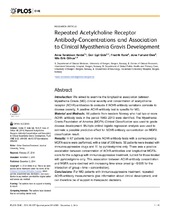Repeated acetylcholine receptor antibody-concentrations and association to clinical myasthenia gravis development
Heldal, Anne Taraldsen; Eide, Geir Egil; Romi, Fredrik Robert; Owe, Jone Furulund; Gilhus, Nils Erik
Peer reviewed, Journal article
Published version
Permanent lenke
https://hdl.handle.net/1956/9581Utgivelsesdato
2014-12-02Metadata
Vis full innførselSamlinger
Originalversjon
https://doi.org/10.1371/journal.pone.0114060Sammendrag
Introduction: We aimed to examine the longitudinal association between Myasthenia Gravis (MG) clinical severity and concentration of acetylcholine receptor (AChR)-antibodies to evaluate if AChR-antibody variations correlate to disease severity. A positive AChR-antibody test is specific for MG. Material and Methods: All patients from western Norway who had two or more AChR- antibody tests in the period 1983–2013 were identified. The Myasthenia Gravis Foundation of America (MGFA) Clinical Classification was used to grade disease development. Multiple ordinal logistic regression analysis was used to estimate a possible predictive effect for AChR-antibody concentration on MGFA classification result. Results: In 67 patients two or more AChR-antibody tests with a corresponding MGFA-score were performed, with a total of 309 tests. 56 patients were treated with immunosuppressive drugs and 11 by pyridostigmine only. There was a positive association between concentration of AChR-antibodies and longitudinal MGFA-score for the subgroup with immunosuppressive treatment, but not for those treated with pyridostigmine only. This association between AChR-antibody concentration and MGFA score declined with increasing time since onset (p = 0.005 for the interaction of group×time×concentration). Conclusions: For MG patients with immunosuppressive treatment, repeated AChR-antibody measurements give information about clinical development, and can therefore be of support in therapeutic decisions.

